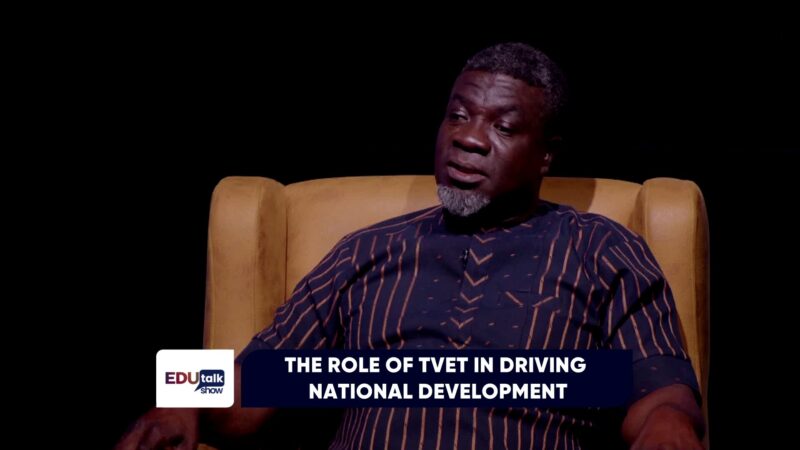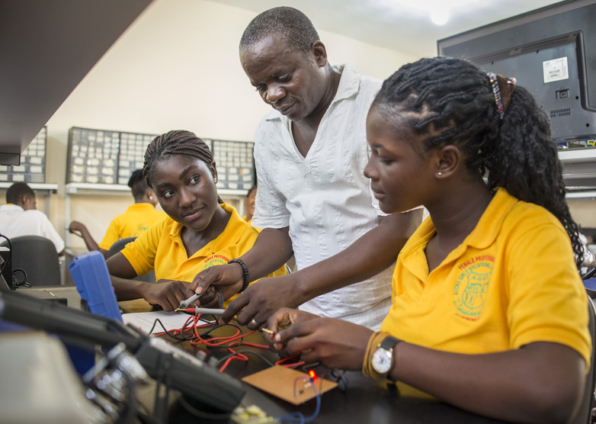The Director-General of the Ghana Technical and Vocational Education and Training (TVET) Service, Mr. David Prah, has stated that TVET education is key to solving the unemployment crisis in Ghana.
Speaking on JoyNews’ EduTalk Show with Emefa Apawu, Mr. Prah compared the country’s current education focus to advanced economies, highlighting that while TVET creates employment opportunities, general education tends to increase unemployment.
“TVET education produces employment, whereas grammar education automatically produces unemployment,” Mr. Prah remarked.

He explained that developed countries emphasize skills training through TVET and STEM (Science, Technology, Engineering, and Mathematics) education, which equips their youth with the practical skills needed to secure jobs. “In Ghana, we still prioritize grammar and general education, but this approach is not aligned with the current job market demands,” he added.
Mr. Prah pointed out the growing demand for skilled graduates in sectors such as construction, welding, and fabrication, particularly within the oil and gas industry. He shared that companies like Sentuo Oil Refinery Limited are actively looking for trained workers but cannot find enough qualified graduates to fill the gap.

“For instance, Sentuo Oil Refinery Limited has asked the TVET Service to produce about 15,000 welders, but we cannot meet that demand because the need is so great, especially for gas welders in both onshore and offshore roles,” he said. The shortage of skilled workers, especially in critical industries like oil and gas, shows the urgent need for more robust vocational training programmes in Ghana.
To tackle this challenge, Mr. Prah outlined several initiatives that the government is implementing to boost vocational training and reduce youth unemployment. One of these is the Ghana TVET Voucher Project, which provides scholarships to individuals in the informal sector, allowing them to receive technical training at no cost.
“The TVET Voucher Project is one of the key programmes that is reducing unemployment. It’s training about 20,000 young people, particularly those in the informal sector, without them having to pay for it,” Mr. Prah explained.
He noted that this initiative is part of a broader effort to provide more opportunities for youth to gain practical skills through partnerships with various industry stakeholders.
He also mentioned a collaboration with the Youth Employment Agency (YEA), which is set to provide further training to another 20,000 young Ghanaians.
“We have partnered with YEA to extend training to another 20,000 youth in the informal sector. This collaboration is helping us equip more young people with the skills they need to secure employment,” he said.
According to Mr. Prah, Ghana’s educational system must shift its focus to skills-based learning, which has proven to be more effective in developed countries. He emphasized that TVET and STEM should be prioritised over general education to align with the needs of the labor market.
“Countries that have tackled unemployment have done so by focusing on skills development, particularly TVET and STEM education. If we continue to concentrate on grammar and general education, we will keep producing unemployed graduates,” he stated.
The TVET Director-General believes that changing attitudes toward vocational education is essential to ensuring that young Ghanaians are equipped for the workforce.
Mr. Prah’s comments highlight the importance of TVET in addressing Ghana’s growing youth unemployment crisis. By providing practical skills needed in high-demand industries like construction, oil and gas, and manufacturing, TVET offers young people a direct pathway to employment.

The government’s efforts to retool and equip TVET institutions, along with partnerships with industry and other stakeholders, are aimed at scaling up vocational education across the country.
As Mr. Prah noted, “The advanced countries focus on skills, and that’s why they have fewer unemployment issues. In Ghana, we must change our attitude toward TVET and make it more attractive to our youth.”
With TVET programmes expanding and demand for skilled workers rising, Mr. Prah believes Ghana is moving in the right direction.
However, the country must continue to prioritise technical education if it hopes to fully address youth unemployment and ensure a skilled workforce for the future.
Latest Stories
-
Alan promises to amend the Constitution to limit presidential powers
5 mins -
Ghana to face liquidity pressures in 2025, 2026 despite restructuring most of its debt – Fitch
8 mins -
NPP’s record of delivering on promises is unmatched – Bawumia
9 mins -
Mahama: It’s time to dismiss the incompetent NPP government
11 mins -
Today’s front pages: Monday, November 25, 2024
25 mins -
T-bill auction: Government misses target again; interest rates continue to rise
27 mins -
We have a bad technical team; Otto Addo and his team should go – Ernest Thompson
2 hours -
Hindsight: Why Accra Lions’ present problems do not define them
2 hours -
10-year-old Lisa Laryea arrives at Wits Donald Gordon Hospital in South Africa for bone marrow transplant
3 hours -
23 ambassadors inducted to take on 2025 GSTEP Challenge in three regions
3 hours -
Ghana Shea Workers Union inaugurated
3 hours -
Microsoft 365 under attack – how to bulletproof your business against cyber threats
3 hours -
I trust Bawumia; he has never lied to me – Akufo-Addo
3 hours -
Bawumia is hardworking; offers the youth platform to share ideas – Kow Essuman
3 hours -
IGP, Police commanders worship with churches in Ghana as part of security arrangements for 2024 elections
4 hours

